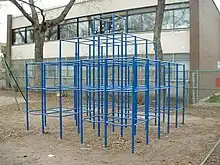Jungle gym
A jungle gym (called a climbing frame in British English) is a piece of playground equipment made of many pieces of material, such as metal pipes or ropes, on which participants can climb, hang, sit, and—in some configurations—slide. Monkey bars are a part of a jungle gym where a user, hanging in the air, swings between evenly spaced horizontal bars. In Australian English, the term "monkey bars" is sometimes used to refer to the entire jungle gym.

History

The first jungle gym was invented in 1920 and patented by lawyer Sebastian Hinton in Chicago.[1] It was sold under the trademarked name Junglegym. Hinton's second prototype "jungle gym" is still standing at the Winnetka Historical Society where it was relocated from the Crow Island School in Winnetka, Illinois.[2][3] The term "monkey bars" appears at least as far back as the 1930s,[4][5] though Hinton's initial 1920 patent appeals to the "monkey instinct" in claiming the benefits of climbing as exercise and play for children,[6] and his improvement patents later that year refer to monkeys shaking the bars of a cage, children swinging on a "monkey runway", and the game of "monkey tag".[7]
When Sebastian Hinton was a child, his father, mathematician Charles Hinton, had built a similar structure from bamboo with the goal of enabling children to gain an intuitive understanding of three-dimensional space through a game in which numbers for the x, y, and z axes were called out, and each child tried to be the first to grasp the indicated junction. Thus, the abstraction of Cartesian coordinates could be grasped as a name of a tangible point in space.[2][8]
Safety
To reduce the risk of injury from falls, jungle gym areas often have a thick layer of woodchips, sand or other impact-absorbing material covering the ground. The American National Safety Council recommends that playgrounds have at least 12 inches (30 cm) of such material.[9]
Gallery
 A small jungle gym
A small jungle gym Hanging from monkey bars
Hanging from monkey bars Landscape structures mobius climber
Landscape structures mobius climber Landscape structures spacenet climber
Landscape structures spacenet climber Boy in front of jungle gym, 1967
Boy in front of jungle gym, 1967 A jungle gym in a school yard in Sweden, 2012
A jungle gym in a school yard in Sweden, 2012 Japanese schoolgirl on some monkey bars (雲梯), 2014
Japanese schoolgirl on some monkey bars (雲梯), 2014 A jungle gym in Sweden, 2016
A jungle gym in Sweden, 2016 Military variant of the monkey bars
Military variant of the monkey bars
References
- Hinton's original patents for the "climbing structure" are U.S. Patent 1,471,465 filed July 22, 1920; U.S. Patent 1,488,244 filed October 1, 1920; U.S. Patent 1,488,245 filed October 1, 1920; and U.S. Patent 1,488,246 filed October 24, 1921.
- "'J' is for Jungle Gym" from Winnetka, Illinois Historical Society
- "About Us / History". Crow Island School history. Archived from the original on 2020-02-27. Retrieved 2020-02-27.
- DISTRICT OF COLUMBIA APPROPRIATION BILL FOR 1939 HEARINGS BEFORE THE SUBCOMMITTEE OF THE COMMITTEE ON APPROPRIATIONS UNITED STATES SENATE. 1938-01-01.
- Negligence and Compensation Cases Annotated. Callaghan. 1937-01-01.
- In U.S. Patent 1,471,465 Hinton wrote on page 3, "Again and importantly, the monkey instinct strong in all human beings and perhaps more clearly displayed in children, makes climbing a sport to which children enthusiastically take, by a psychology about the same as that of a kitten at play with a ball, which of course is practice for hunting."
- In U.S. Patent 1,488,244 Hinton wrote on page 3, "I have found, however, that children seem to like to climb through the structure to some particular point, and there swing head downward by the knees, calling back and forth to each other, a trick which can be explained of course only by the monkey instinct", and on page 4 he wrote, "I make considerable point of the great strength of the structure, as this is important. Thus most persons have seen a monkey in a zoo, seize the bars of his cage with hands and feet and throw his body violently back and forth, other monkeys following suit. Children in the structure I have erected do the same thing, apparently unconscious of any imitation of monkeys. It can be appreciated that with twenty-five or thirty heavy boys doing this, the strains on the structure are very great."
- Borrelli, Christopher (November 19, 2018). "In Winnetka, the jungle gym was born. A look at its evolution, from sky-high rusted pipes to soft, risk-averse playgrounds". Chicago Tribune. Retrieved June 29, 2023.
- "Playground Safety - National Safety Council". National Safety Council. Retrieved 7 March 2023.
External links
 Media related to Jungle gyms at Wikimedia Commons
Media related to Jungle gyms at Wikimedia Commons